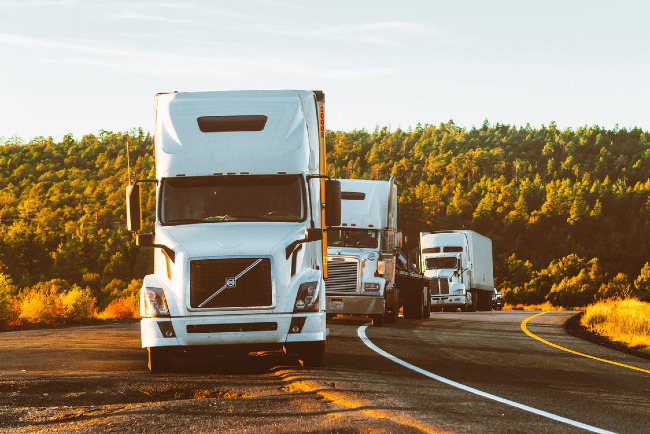
5 Technologies That are Transforming the Trucking Industry Now
The trucking industry is the heart of the Canadian economy. It is expected to see continued growth in the upcoming years. However, the trucking industry is facing challenges that can hinder the growth process. These challenges include rising fuel costs, inefficiencies in fleet management, and low driver security and safety. However, digital technologies are slowly making inroads in the trucking industry and helping it to overcome these challenges by simplifying various operations involved in the industry. In this blog, we, at Digital Fractal, have listed five technologies that are transforming the trucking industry, paving the way for a growth-oriented future.
1) Artificial Intelligence
Trends witnessed in artificial intelligence technology in the last few years have shown its potential to transform various industries. The trucking industry, too, can benefit from advancements in AI.
In the trucking industry, artificial intelligence sees multiple applications. It can be used to automate back-office tasks. The technology can be used in document management processes to read, edit, and organize documents. The manual process of document management is prone to errors and can cause serious problems in case of any mistake committed by an employee. AI can help reduce manual errors, ensuring that businesses save time and money spent in the processes. Similarly, the human resources saved can be used to carry out other significant tasks.
Another area of application of AI in the trucking industry is vehicle route optimization. AI can help simplify the transportation and delivery process by collecting and analyzing data from smart devices installed on the vehicles. After analyzing the data, the AI algorithms can provide drivers with safer and shorter delivery route options, helping save time and fuel costs.
2) IoT

IoT devices can be used for the real-time monitoring of trucks. Organizations will have a complete overview of every vehicle with the help of IoT devices. These devices can help improve transparency and reduce instances of discrepancies between managers and drivers. IoT devices can also be used to collect important information such as the load on trucks, the condition of goods, and the route traffic. Thus, businesses can have complete control over their operations with the help of IoT devices.
Another area where IoT devices can be used in the trucking industry is inventory and warehouse management. RFID tags, sensors, and scanners provide real-time information about goods. The data can be collected and organized in a centralized warehouse management system. The inventory and warehouse data can then be relayed to authorities seamlessly with email or other automated response systems.
IoT devices can also significantly enhance driver and vehicular safety. IoT devices installed on trucks can continuously gather data in real-time and help detect unwanted situations such as vehicle breakdowns and bad traffic and weather conditions well in advance.
3) Blockchain
Blockchain technology provides an immutable ledger and helps bring transparency in most operations involved in the trucking industry.
One of the main features of blockchain is smart contracts. With smart contracts, businesses can automatically carry out transactions, reducing errors and helping save time and resources. For example, businesses can program a smart contract to pay a supplier when an item has reached the desired location automatically. Once the supplier enters the delivery details, and if they match the data collected from other sources such as IoT devices, the contract can be executed. The supplier will be paid automatically without the need for human intervention.
Similarly, blockchain can also be used for order tracking and authentication. Since the data on the blockchain is immutable, the instances of frauds can be reduced significantly, allowing businesses to track information related to orders in a transparent manner. For example, if an employee has entered the delivery time of a product on the blockchain, the data cannot be modified, and the information can be used in case of discrepancies between the business and the customer.
4) Electrically-powered Vehicles
To fight the battle against climate change, it becomes necessary to lower our dependence on fossil fuels. Electrically-powered vehicles can result in being an excellent option to cut down fossil fuel usage and move to a more environment-friendly medium. The benefits of using electric vehicles are, however, much more than reduced environmental impact. Electric vehicles are more efficient than diesel vehicles. Thus, businesses can end up saving money in operations with such vehicles. Similarly, electric vehicles have lower maintenance costs, which again contributes to financial savings for the business.
Adopting electric trucks can also help in improving brand value and recognition with the public sentiment inclined towards protecting the environment against climate change.
5) Cloud-Based Mobile Solutions
Businesses can easily manage their operations with a cloud-based mobile app. With cloud services, employees can access data on their smartphones anytime and anywhere. They can update their digital timesheets, which allow employers to easily manage and track their employees, which is crucial for remote workers such as truck drivers. Similarly, delivery guys can easily upload documents regarding deliveries, inventory, and vehicle maintenance easily through digital forms. Cloud-based mobile solutions can also help enrich the customer experience as customers can easily track, locate, and return their orders with just a few clicks.
The influx of the above-mentioned technologies can help revolutionize the trucking industry. Businesses can improve every operation involved and are guaranteed higher growth by adopting one or a combination of these technologies. Digital fractal can help in your growth by developing solutions leveraging these technologies. To know more, you can get in touch with us.

